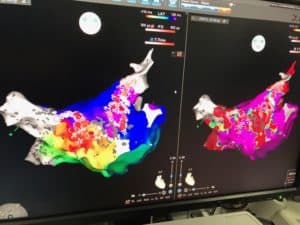EP Study
There are many types of abnormal heart rhythm, some minor, some troublesome and some posing a risk to life. Clues to the precise rhythm change may come from a 24 hour Holter monitor or similar device. Some patients, however, may require an electrophysiological study (EPS), an inpatient procedure designed to assess the electrical pathways and electrical stability within the heart.
Using fine tubes (catheters) passed from a vein, usually in the groin, to the heart under local anaesthetic and using X-ray guidance and other imaging techniques, the resting heart rhythm can be analysed with multiple recordings of the electrical pathway. The electrical signals are transmitted from the catheter(s) to a monitor displaying the information as intracardiac electrograms (see image to the right). Spontaneous changes in heart rhythm can be assessed and the heart can also be stimulated in order to provoke potentially abnormal rhythms, which can be recorded and identified.
Abnormal electrical pathways can be located and in many cases they can be inactivated by using an energy wave, typically radiofrequency or cryoablation (freezing), to “ablate” the pathway and stop the abnormal heart rhythm. This is usually performed immediately after the initial diagnostic EP study for patient convenience. Some pathways are easy to map and ablate and others are not, particularly in the context of significant structural abnormalities of the heart. The length of the procedure (from one hour to several hours) and the likelihood that a subsequent ablation is successful depends on many factors and will be specific to the patient. As with all procedures there are recognised complications, which need to be weighed against the potential benefit; these will be discussed by the electrophysiologist undertaking the procedure as part of the consent process.

Related links:
Symptoms - Palpitations, dizzy spells and
blackouts
Palpitations are a common symptom that may or may not signify an important underlying heart problem. Read more
Conditions - Atrial Fibrillation
Atrial fibrillation (often abbreviated to “AF”) is a very common heart rhythm disturbance, affecting over a million people in the UK. Read more
Conditions - Other Arrhythmias
For the heart to beat effectively the heart muscle cells must contract in an organised and predetermined way. Read more
Tests - ECG Monitoring
There are several different types of ECG monitoring, chosen based on symptoms or the condition in question. Read more
Treatments - Ablation
The role of ablation in the treatment of various abnormal heart rhythms has evolved over the last two decades and now has an established place in the management of various arrhythmias, the most common of which is atrial fibrillation. Read more